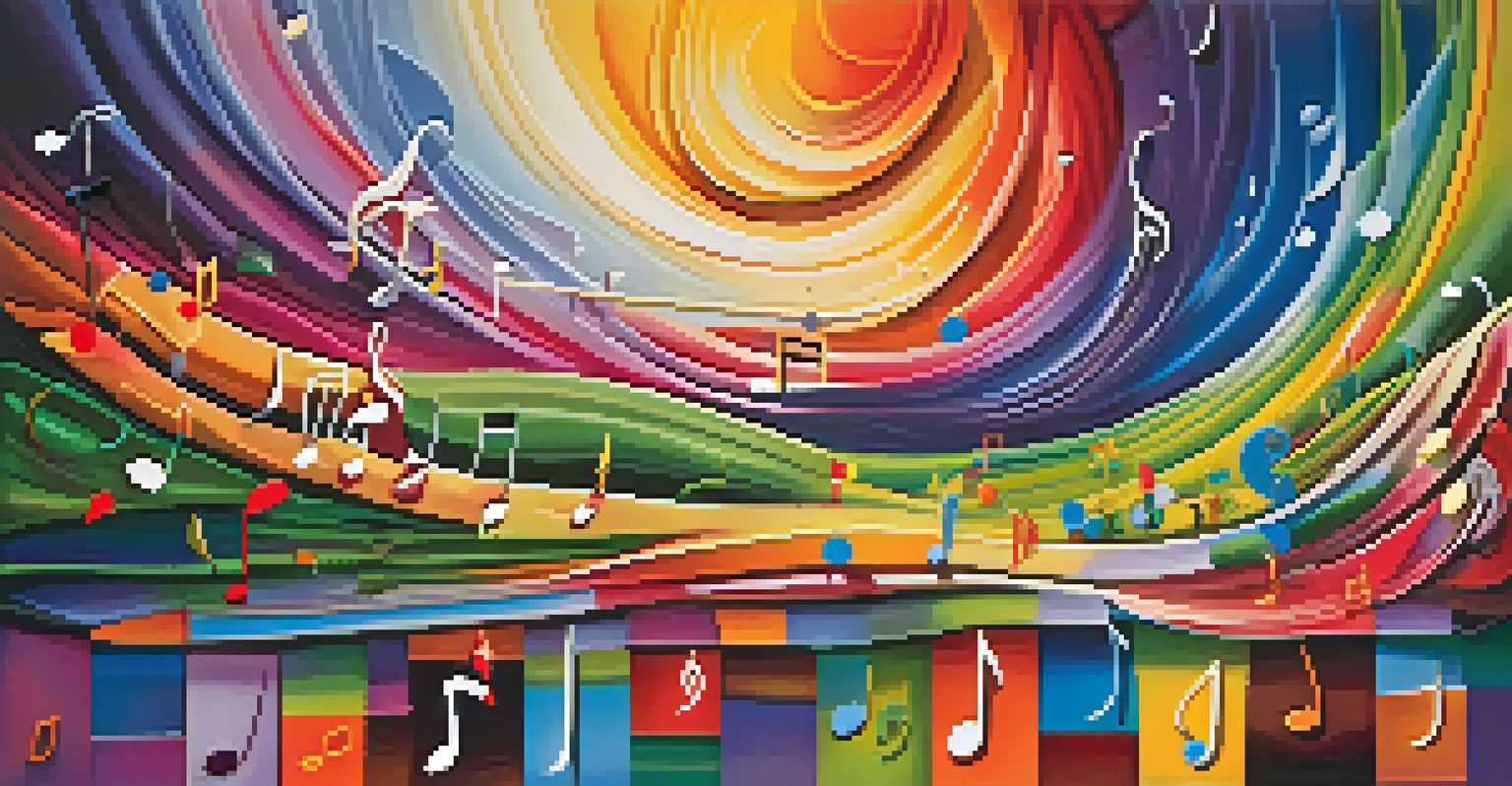The Science of Music and Its Role in Social Bonding

Understanding the Psychological Impact of Music
Music has a profound impact on our emotions and thoughts. Research shows that listening to music can elevate our mood, reduce stress, and even influence our perception of time. This psychological effect forms the basis for why music is often used in social settings, from parties to weddings.
Music can change the world because it can change people.
When we listen to a favorite song, our brain releases dopamine, a chemical associated with pleasure. This response fosters a sense of connection, not just to the music itself but also to those we share it with. It’s no wonder that music often becomes the backdrop for life’s most memorable moments.
Moreover, our emotional responses to music can vary based on personal experiences and cultural backgrounds. This diversity enriches our social interactions, allowing us to bond over shared feelings elicited by a song, regardless of our different backgrounds.
The Role of Music in Group Cohesion
Music has been a part of human culture for thousands of years, serving as a unifying force. Whether it's singing around a campfire or participating in a concert, these shared musical experiences foster a sense of belonging among participants. This is especially evident in communal activities like choirs or marching bands.

Engaging in music as a group enhances feelings of trust and cooperation. Studies suggest that when people sing or play instruments together, they synchronize their movements and breathing, building a bond that transcends spoken language. This physical alignment creates a shared rhythm that strengthens social ties.
Music Enhances Emotional Connections
Listening to music triggers dopamine release, fostering emotional bonds and shared experiences among individuals.
Additionally, group music-making can promote empathy among individuals. When people create or perform music together, they become attuned to each other's emotions, leading to deeper connections and understanding. This emotional resonance can encourage collaboration and a sense of community.
Music as a Tool for Communication
Music serves as a powerful form of non-verbal communication, conveying emotions and messages that words sometimes can't capture. For instance, the deep, resonating tones of a cello might evoke sadness, while an upbeat pop song can inspire joy. This universality allows people to share experiences without needing to speak the same language.
Where words fail, music speaks.
In many cultures, music is used in rituals and ceremonies, acting as a bridge between the spiritual and social realms. For example, during celebrations, specific songs can signify joy and togetherness, while others might express grief and remembrance. Through these musical expressions, communities reinforce their values and connections.
Furthermore, the emotional themes in music often resonate with listeners, leading to conversations about shared feelings and experiences. This can create a deeper understanding among individuals, allowing them to bond over personal stories related to the music they love.
The Evolutionary Perspective on Music and Bonding
From an evolutionary standpoint, music may have played a crucial role in human social development. Some researchers propose that our ancestors used music as a means to strengthen group cohesion and enhance survival. The ability to communicate and bond through music likely increased cooperation among early humans.
Evidence suggests that musical abilities provided a competitive advantage in social settings, helping individuals attract mates and establish alliances. This theory highlights how music is not just an art form but a vital part of our evolutionary history, shaping our social structures.
Group Music Fosters Unity and Trust
Participating in music as a group synchronizes movements and breathing, enhancing feelings of trust and cooperation.
Moreover, as societies evolved, so did the complexity of music, reflecting and influencing social dynamics. Today, we see music as a tool for both personal expression and collective identity, emphasizing its lasting impact on human relationships.
The Impact of Live Music on Social Interaction
Attending live music events, such as concerts and festivals, creates unique opportunities for social bonding. The shared experience of being part of a crowd, feeling the energy of the music, and singing along with others fosters a sense of community among attendees. It's a powerful reminder that music can unite people from diverse backgrounds.
In these settings, individuals often form connections with strangers, united by their appreciation for the same artist or genre. These spontaneous interactions can lead to friendships and lasting memories, showcasing music's role as a social catalyst.
Additionally, the atmosphere of live events encourages people to let their guard down, facilitating openness and vulnerability. This emotional release creates a bonding experience that can transcend the event itself, leaving attendees with a feeling of connection long after the last note has been played.
Music, Memory, and Social Bonding
Music has an incredible ability to trigger memories, often taking us back to specific moments in our lives. This phenomenon can strengthen social bonds, as shared songs remind individuals of experiences they had together. Whether it’s a first dance at a wedding or road trips filled with sing-alongs, these memories can reinforce connections.
Nostalgia plays a significant role in how we relate to music and each other. When we reminisce about a song, we often recall the people we were with, making those memories more vivid. This shared nostalgia can deepen relationships, as it encourages storytelling and discussions about past experiences.
Music Bridges Communication Gaps
Music serves as a powerful non-verbal communication tool, conveying emotions and messages that transcend language barriers.
Furthermore, music's capacity to evoke emotions linked to memories can enhance empathy among individuals. When we share music that resonates with our life stories, it opens the door for others to understand our feelings and experiences, ultimately strengthening social bonds.
The Future of Music and Social Connection
As technology continues to evolve, so does the way we experience and share music. Streaming platforms and social media have made it easier than ever to connect with others through music, allowing people to discover new genres and artists from around the world. This accessibility can create new social bonds among fans of various musical styles.
Virtual concerts and collaborative music-making platforms also offer unique opportunities for social interaction. These digital experiences can bring together individuals who may never meet in person, fostering connections through a shared love of music, regardless of geographical barriers.

Looking ahead, the role of music in social bonding is likely to grow even more significant. As we navigate an increasingly digital world, finding innovative ways to connect through music will be essential for maintaining the deep human connections that enrich our lives.